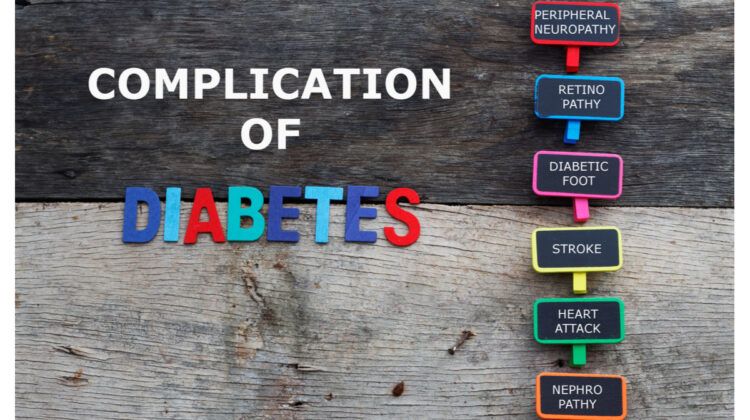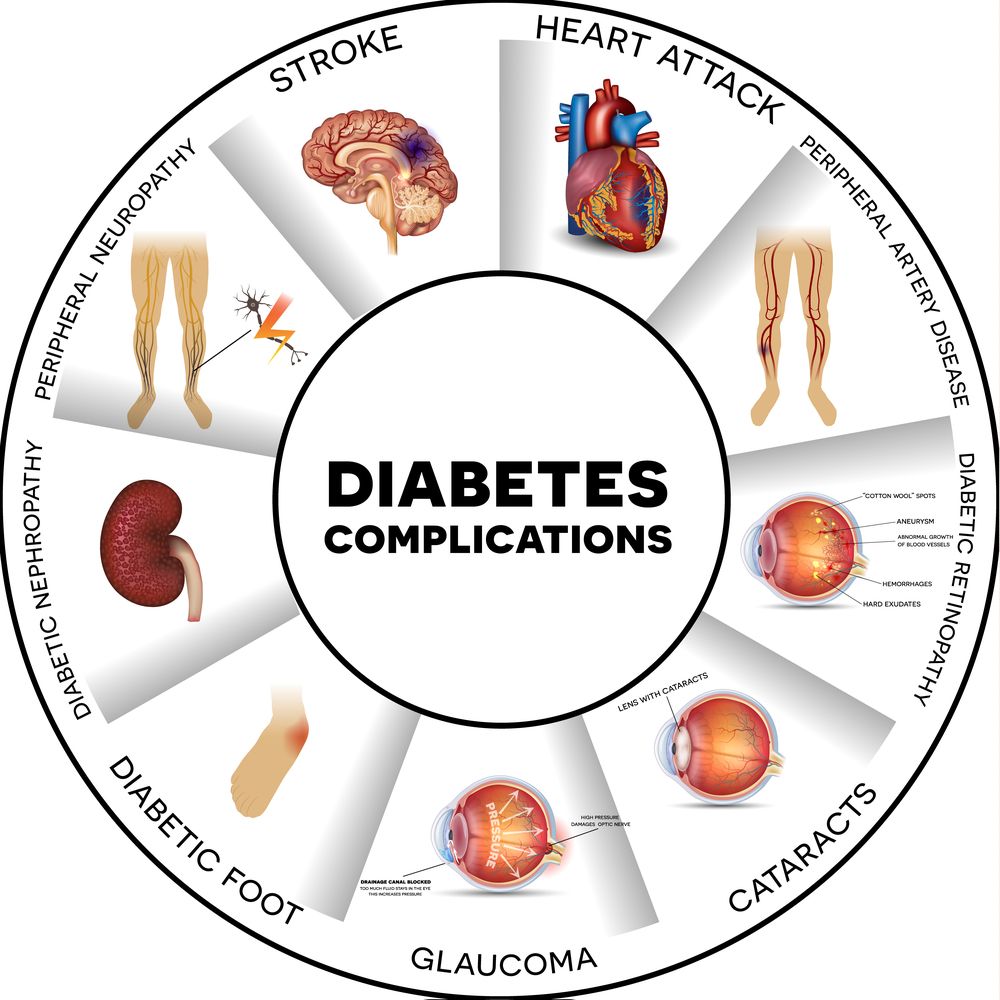The Nine Worst Complications of Diabetes

What exactly is diabetes?
Your blood glucose or blood sugar levels are too high if you have diabetes. You consume foods that contain glucose. A hormone called insulin facilitates the entry of glucose into your cells, where it provides energy. Having type 1 diabetes prevents your body from producing insulin. When you have type 2 diabetes, your body struggles to produce or utilize insulin. Insufficient insulin causes glucose to remain in your blood.
What medical issues might diabetes lead to?
Over time, issues brought on by having too much glucose in the blood include:
- Changing fluid levels, tissue swelling, and damage to the blood vessels in the eyes all contribute to eye illness.
- Foot issues are brought on by nerve damage and decreased blood flow to your feet.
- Gum disease and other dental issues can result from high blood sugar levels in saliva because they encourage the growth of dangerous bacteria in the mouth. Plaque is created when the bacteria and food combine to produce a soft, sticky coating. Plaque can also result from consuming foods high in sugar or carbohydrate. Some kinds of plaque contribute to foul breath and gum disease. Cavities and tooth decay are caused by other types.
- Damage to your blood vessels and the nerves that control your heart and blood vessels is what leads to heart disease and stroke.
- Kidney disease is brought on by the kidneys’ blood arteries being damaged. High blood pressure often develops in diabetics. That may harm your kidneys as well.
- Damage to the nerves and the tiny blood arteries that supply your nerves with oxygen and nutrients results in nerve issues (diabetic neuropathy).
- Sexual and bladder issues brought on by nerve injury and decreased blood supply to the genitalia and bladder
- Skin conditions, including some that are brought on by diminished circulation and alterations to the small blood vessels. Additionally, infections, including skin infections, are more common among diabetics.
Know more about the complications of diabetes

1. Heart Condition
Among the most prevalent consequences of diabetes is heart disease. Your doctor may conduct a few tests during office visits to look for cardiovascular disease and to assist you in avoiding any severe heart-related issues. Your doctor will measure your blood pressure every time you see them by wrapping a cuff over your upper arm and tightening it to measure the flow of the blood through your arteries. Additionally, they will draw a tiny amount of blood from your arm to measure your triglyceride and LDL (Low-Density Lipoprotein) cholesterol levels.
A comprehensive medical record should also include a baseline EKG. Find out more about your risk factors for heart disease, such as family background or whether you smoke, and develop a prevention strategy that includes stress reduction, regular exercise, and weight loss in addition to maintaining healthy levels of blood pressure, cholesterol, and triglycerides.
2. Stroke
Sudden weakening on one side of the face or body, numbing in the face, arm, or leg, difficulty speaking, difficulty seeing clearly with both eyes, and dizziness are all indications of a stroke. Visit a doctor right away if you experience any of these signs. A neurologist or another stroke specialist may be recommended for you. Learn more about the stroke warning signs and how to avoid this major issue by reading up on them.
3. Diabetic kidney disease (kidney disease)
A yearly urine test should be done if you have diabetes to check for diabetic nephropathy or kidney disease. You should also get a baseline creatinine blood test to find out how well your kidneys are working. If you have a higher risk of developing kidney disease due to high blood pressure, heart illness, or a family history of kidney failure, you might require more frequent testing.
Albumin, a blood protein that might show up in your urine if your kidneys are damaged, will be checked for by your doctor using a sample of your urine. Additionally, a blood sample will be taken to determine your glomerular filtration rate (GFR), which is a gauge of how well your kidneys are removing waste from your blood.
Regular blood pressure checks will also be performed by your healthcare practitioner because preventing high blood pressure is crucial to delaying renal damage. Less than 130/80 should be your reading.
4. Diabetes neuropathic pain (Nerve Damage)
Diabetes can damage your nerves over time, leading to symptoms like numbness, burning, or pain in your hands, feet, or legs. You might not notice tiny wounds that could develop into more serious health risks if your skin becomes numb. Every day, check your hands and feet for redness, calluses, cracks, or skin deterioration. Before your next appointment, call your doctor right away if you experience any of these symptoms.
Your doctor will perform a comprehensive examination of your feet at least once every year to look for these issues. They will poke your feet with a tiny needle or tap them with a device resembling a nylon hairbrush bristle. You might have nerve damage if you cannot feel it.
Every time you see a doctor after receiving a diagnosis of peripheral diabetic neuropathy, you should have your feet thoroughly examined.
5. Diabetic retinal disease (Eye Damage)
All diabetics should visit an ophthalmologist (an eye doctor) at least once a year to protect their vision. Your eyes will be dilated as part of the eye examination so that the doctor can examine the retina at the back of the eye and assess whether diabetes is harming it. Your doctor inserts a drop into your eyes to temporarily enlarge your pupils so they may be measured. Then, they examine your retina and optic nerves using a powerful magnifying lens. They will also assess your eye pressure, side vision, and distance vision. The examination is painless. Bring sunglasses and arrange for someone else to drive you home because you will be sensitive to light, and your vision will be foggy for a while. Once a patient is 10 years old or older and has had type 1 diabetes for three to five years, they should begin receiving annual check-ups. Once type 2 diabetics are identified, they should get their initial eye examination. Patients with eye issues could require more regular visits to the ophthalmologist. Pregnant women with diabetes should have a thorough eye exam in the first trimester and close follow-up appointments with an eye doctor throughout the pregnancy. (Women who acquire gestational diabetes are not covered by this advice.)
6. Diabetic Gastroparesis
Diabetic gastroparesis increases your risk. The stomach’s nerves become injured and stop functioning properly when a person has gastroparesis. This makes it difficult to control blood sugar levels because the stomach takes too long to empty its contents. Sometimes, altering your diet can be beneficial. For gastroparesis, there are certain drugs and therapies.
You could require a few of these tests:
- Upper gastrointestinal endoscopy
- GI upper series
- stomach emptying imaging
- SmartPill
- breath test for gastric emptying
To help doctors determine whether your digestive system is functioning properly, these tests typically include you eating or drinking something or undergoing an imaging test (like an X-ray).
Consult your doctor for advice on avoiding diabetes problems. Find more about early warning symptoms so you can get treatment when it will be most beneficial.
7. Erection problems
The likelihood of having impotence or erectile dysfunction increases with diabetes. For some men, treating their erectile dysfunction may be as simple as changing to a healthy lifestyle, which includes stopping smoking, exercising frequently, and managing their stress. It is crucial to discuss your erectile dysfunction with your medical professional, as they may be able to suggest additional treatments, such as drugs, a vacuum constriction device (VCD), and other erectile dysfunction solutions. Skin Issues
At some point in their lives, up to one-third of diabetics will experience a skin issue connected to their illness. High blood glucose levels can inhibit the body’s capacity to mend itself and provide an ideal environment for bacteria and fungi to grow. Fortunately, if detected early enough, many skin problems can be avoided and successfully treated. With type 2 diabetes, a minor skin ailment can become a serious issue with potentially serious repercussions if it is not properly cared for.
8. Infection
The immune system of people with type 2 diabetes is less effective. Sugar levels in your body’s tissues rise because of elevated blood glucose. When this occurs, bacteria multiply and illnesses may worsen. Your bladder, kidneys, vagina, gums, feet, and skin are typical infection sites. Infections that are treated quickly can avoid more serious effects.
9. Dental Conditions and Diabetes
Serious dental and oral health issues are more likely to occur in diabetics than in healthy individuals. Dental and oral health issues are more prone to develop when blood sugar levels are out of control. This is due to white blood cell impairment brought on by uncontrolled diabetes, which compromises the body’s principal line of defense against infections that might develop in the mouth. Plaque left untreated over time can result in tooth decay, gingivitis, periodontitis, and tooth loss. Therefore, be on the lookout for symptoms of gum disease, such as swollen, painful, or bleeding gums. Regardless of whether you have diabetes, make sure to brush, floss, and use antimicrobial mouthwash every day. To avoid significant tooth issues, schedule regular cleanings, and examinations with your dentist.
